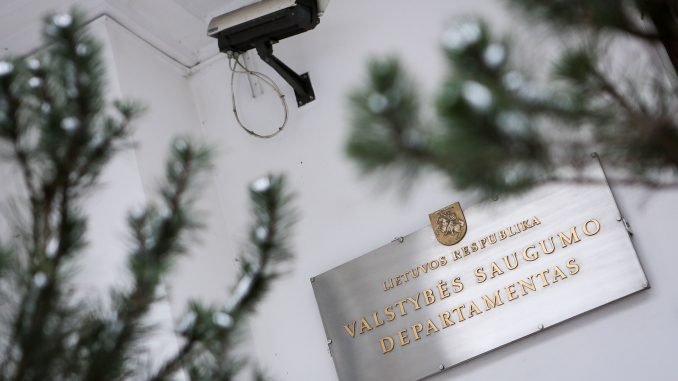
The Law on the Lithuanian Intelligence Ombudsperson may also find itself on the shelf of vetoed legislation, Mečys Laurinkus writes in lrytas.lt news portal.
According to the draft, the purpose of the law is to “establish a legal framework for independent external oversight of intelligence institutions, which guarantees the independence and legality of the activities of intelligence institutions and complies with the requirements for the protection of human rights and freedoms.”
Public scrutiny of intelligence has existed in democracies for 75 years, has been implemented in various ways, has been the subject of much debate and continues to be disputed to this day.
Lieutenant General R. Gehlen (1902-1979), who was one of the leaders of the Wehrmacht’s intelligence on the Eastern Front and who founded the Gehlen Organisation in the post-war period, and who headed the Federal Intelligence Service of the German Federal Republic, wrote: “The West German press now mechanically repeats the idea of the ‘accountability’ of the intelligence service, and even implies that it should be reorganised in this way.
I remind you: I have always been convinced that such organisations and their procedures can only be open to limited inspection. Because of the nature of its activities, the secret service should not be dragged into public controversy, except in the rare case of managed ‘public relations’… A transparent secret service is a logical contradiction in terms.”

In 1947, a clause was added to the US National Security Act to allow control of CIA activities. Subsequently, specialised control organisations for US intelligence agencies emerged.
One of the most influential was the President’s Foreign Intelligence Advisory Board (1956), created by President Dwight D. Eisenhower. The board was made up of influential public figures, prominent businessmen, experienced diplomats and former heads of special services.
Later still, President Carter established a council of three eminent persons to assess the legitimacy of the entire US intelligence community. Naturally, Congress and the Senate were involved.
Debates raged over how to reconcile freedom, privacy and security, where the boundaries of the special services lay, and who was able to control them.
The current panorama of intelligence control is as follows: there are three types of control – parliamentary, independent committees (including public representatives) and ombudspersons.
Germany, Australia, Austria, Denmark, USA, France, Greece, Netherlands, Italy, Norway, New Zealand, UK, Switzerland – parliamentary control. Belgium, Canada, Israel, Portugal – independent (mixed) committees. Finland, Ireland, Sweden – ombudsmen.

Parliamentary scrutiny is the most effective. Provided, of course, that it is honest. The US and Germany are the best in this respect. There is little parliamentary scrutiny in France.
Independent committees face problems with access to sensitive information.
Heads of services, in defence of the agency, resist giving what they consider sensitive information to the scrutineers.
The least effective form of control are ombudspersons. They are effectively a reactive body, investigating complaints and dissatisfaction.
The current parliament is opting for the intelligence ombudsperson option. Why is there a need for such an institution and what has gone wrong in this respect so far?
After independence, Lithuania immediately took on parliamentary control of its intelligence structures.
In legal writing, everything was done well, in a modern and democratic way, but in practice the control was flawed.
The political battles in parliament have had a major impact both on the development of the services and on their control.
It was precisely because of the political battles that the activities of the relevant subcommittees of the NSGK could not be organised.
On the other hand, it is a very difficult job with a lot of paperwork. Who will be willing to sacrifice themselves for it?
What is new about the idea of an intelligence inspector?
The focus is on investigating complaints against the VSD and the relevant service within the Ministry of Defence. The draft does not talk about other institutions involved in intelligence activities.
You can complain as much as you like about the activities of the STT, go ahead if you have the time and paper to spare, complain all you like.
Complaints about the intelligence services are dealt with by the Seimas Ombudsperson.
Once the procedure for adopting the law is underway, there will be a specific problem as to whether the function of the Seimas Ombudsperson should be abolished.
It is easy to predict that this dispute will not end well. However, the most important part of the debate will be the possible specific Intelligence Ombudsperson.
I have every reason not to believe that the party orientation of the candidate will be ignored.
And there will be a lot of controversy about the whole ombudsperson’s office – how much it will cost, who they will be, whether there are any links with Russia, China and so on.
Incidentally, the ombudsperson themselves are restricted from travelling to ‘dangerous countries’. It will not be easy to find a candidate.
Is this or is this not the law we need? Since the parliament will never develop full-fledged control because of party infighting, the institution of a relatively independent ombudsperson would fill this gap.
But for me, it is not so much the control of the intelligence institutions that is important, but the effectiveness of the services themselves.
The challenges for the Lithuanian state are great. Not only military ones. In my view, Lithuania struggles with anticipating the economic consequences of its political decisions.
Of course, one can follow Napoleon’s example and throw oneself into battle first and then see what to do.
We know how Napoleon ended up. Serious countries have solid analytical services that provide a great deal of useful assistance to politicians.


Be the first to comment